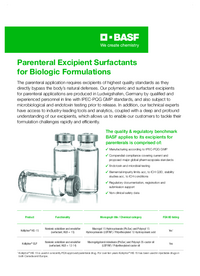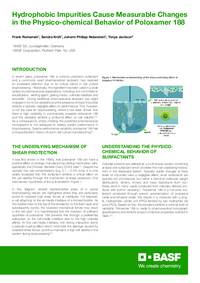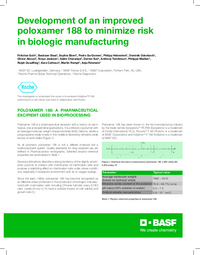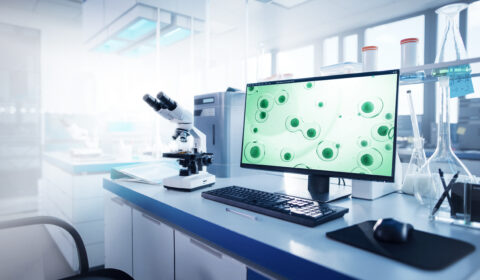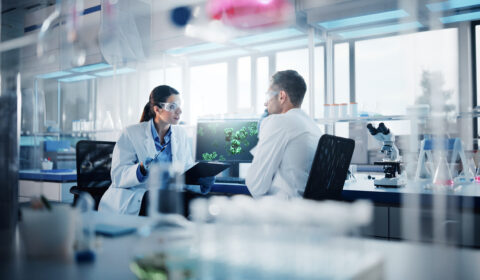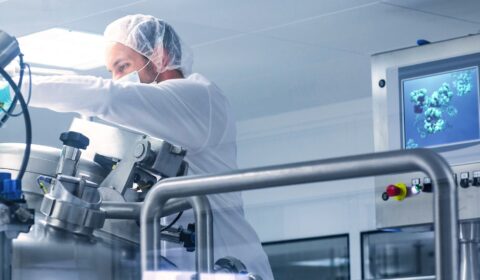Creating best-in-class biopharmaceuticals supported by BASF ingredients
Biopharmaceuticals are playing an increasingly important role in the world of pharmaceuticals and represent some of the best accomplishments of modern science. They are known as one of the most effective clinical treatment modalities for a broad range of diseases, including cancers and metabolic disorders.
Since their production leverages complex biotechnological processes, the requirements and materials for manufacturing biopharmaceutical drugs are dependent on trustworthy suppliers with both the expertise and capability to provide safe, high-quality raw materials. Further, the need for specialty materials, and development of entirely new material science solutions, is increasing quickly due to both technological needs and evolving regulatory requirements.
As leaders in surfactant chemistry and surfactant systems, BASF is using our expertise in chemistry to develop the right materials to overcome challenges and improve the manufacturing of biopharmaceuticals.
“We work to consistently improve upon the ingredients that we provide to biopharma manufacturers,” says Tonya Jackson, Head of Biopharma Ingredients at BASF. “This is where we fit within the biopharma industry. We look for collaborations with the biopharma manufacturers where we can supply our chemical expertise and they can use their biomanufacturing expertise to solve those toughest raw material challenges.”
A deeper commitment to quality materials, regulatory support, and new product development
Given the increased complexity and costs demanded by biopharmaceuticals throughout the value chain, it’s important that the raw materials used to create them are of the utmost quality and safety. BASF has a long history supplying both pharmaceutical and biopharmaceutical manufacturers with a stable, transparent commercial supply of raw materials. We also provide support, including the set-up of BASF products in manufacturers’ systems, from label pictures and packaging information to product numbers, lead times, samples, pricing, documentation for regulatory filing and expert technical support.
This year, BASF greatly increased the internal resources to support the biopharma industry. Our people resources are our biggest asset, so we added dedicated professionals in Quality & Regulatory Management, Technical Product Management, Technical Services, Research & Development, and Application Laboratories. These experts are committed to growing their own expertise, collaborating with their extensive BASF networks, and contributing to the body of knowledge within the biopharma community. You will see their work in publications, posters, presentations, and see them active at conferences, local networking events, regulatory body events, and in various Biophorum workstreams.
Another focus has been on increasing our laboratory capabilities, where we generate application data about our products, work on customer-specific requests for application or material characteristic data, and perform research and development in pursuit of solutions to the raw material challenges our customers face. We have developed multiple labs with an international presence and capabilities that include small-scale cell culture modeling, modeling of foam generation, and protein stabilization studies.
With these resources in place, BASF is partnering with biomanufacturers to further material science solutions in biopharma. Our R&D team is always interested to discuss specific customer challenges, particularly if there is a need for a material that is not commercially available at the adequate quality level.
“BASF plays two critical roles in material science within biopharma: First and foremost, as a chemical company, our level of expertise within the materials we make is extensive and many times we're the original engineers and developers of those chemistries,” Jackson says. “The second is the way that we look towards the future, so we can engineer new molecules and make them at scale. BASF is known for quite a wide variety of chemistries, an extensive R&D, manufacturing and toller networks. We're proud of these capabilities, as we are sometimes the only manufacturer who can do this within cGMP guidelines.”
A strong start in surfactants
One key example is the development of Kolliphor® P188 Bio, our first product made specifically for biopharma. BASF being the original inventor of poloxamer chemistry, we manufacture for a variety of targeted industries covering dozens of different applications. Working with an industry partner, we were able to determine the critical characteristics needed in the material, and match the manufacturing process to ensure cell culture performance consistency across lots. We further built a strong regulatory package, deepened our ability to provide technical support, and ensured a strong and secure supply chain. There is plenty of material on our website about the Kolliphor® P188 Bio and of course it is one of the favorite topics our experts would discuss with anyone who contacts us.
The P188Bio, or poloxamer 188 in general, is a widely used surfactant in both shear protection of upstream cell culture and as an excipient in final biopharma drug formulations. BASF has many technical experts across surfactant chemistry topics, including manufacturing, process optimization, analytics, surfactant systems, modeling, and new chemical engineering. Many of our early projects take advantage of our deep capabilities in this critical space, and we are open to hearing further challenges with surfactants for any biopharma application.
The future of biopharma
Biopharmaceuticals will only increase in popularity as time goes on. It’s estimated that biopharmaceuticals make up over 30% of all current pipeline research programs.
As the prevalence of biopharmaceuticals grows, so too does the importance of providing effective ingredients to manufacturers of these useful medicines in large quantities.
“There's not very many companies that can really supply the volumes that are needed across some of these more complex manufacturing processes,” says Jackson. “In the future of biopharma manufacturing, we expect more defined and stricter regulatory guidelines, more complicated and intense manufacturing processes, and the need for more defined raw materials with higher performance expectations.

